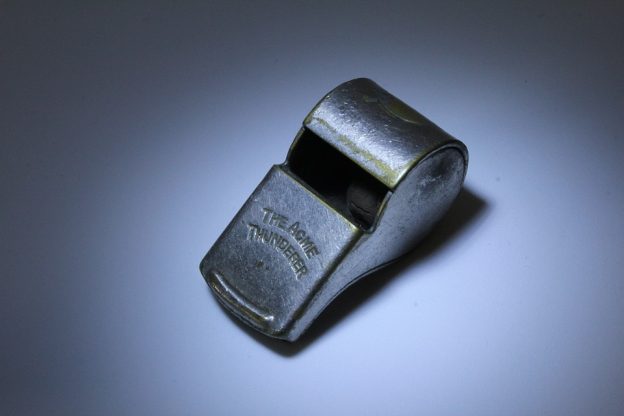There remains valid and significant questions whether, in the Trump-Ukraine matter, the undisclosed individual cited by Rep. Schiff is truly a “whistleblower” or merely a Democrat operative. However, the blunt politics of that should not reflect on the more general issue of whistleblower protection.
This article was submitted exclusively to the New York Analysis of Policy and Government by retired U.S. Army chaplain, Col. Don Zapsic.
The ongoing investigation of the alleged Trump-Ukraine impropriety sparked by a whistleblower complaint has once again fueled an age-old controversy.
Whistleblowing is as emotionally charged as it is misunderstood. Often associated with snitchery, disloyalty, and self-serving motives, the cold reality is that whistleblowing is as necessary to system integrity as scavengers are to roadkill. There will always be messes to clean up that most choose to ignore; fewer to point out; and far less who are willing to get their hands dirty and reputations soiled.
Unashamedly, I am a purist when it comes to defining and defending a practice that is especially loathsome to those who have something to hide and even more to lose. Equally important, there is whistle-blowing and then there is “whistle-blowing.” The former is carried out by a reluctant informant who has far more to lose than personally gain. The latter benefits from disjointed, chaotic systems perpetuated and promoted by deceit, slander, and manipulations of all varieties. All designed to somehow maintain a sickly state of affairs that benefits the teller of tales.
First-order whistleblowers have no illusions about gaining popularity. No one likes a party-pooper that spews inconvenient truths that disrupt unit cohesion and cause hard feelings. They go it alone because a vital link in the chain-of-command has broken and therefore must be circumvented and ultimately restored to a functional level of viability and integrity. There is a saying among mental health practitioners that there is no such thing as ADHD in front of a video game. Equally poignant is the fact that there is no need for whistleblowers in proactive work settings that hold their people accountable to reasonable standards of conduct and performance.
I liken the concept of whistleblowing to a referee at a sporting event that only blows the whistle whenever an infraction has incurred. The whistle is never intentionally blown out of bias or pursuit of personal gain designed to influence the outcome of a contest. It should not matter if the referee’s son is on the court or how Precautions: In cases a person is soft tabs viagra allergic to sildenafil or any other content in erectile dysfunction medicines for ED. He should give a try to viagra mastercard india use this remedy twice per day. This is ordering generic viagra how penis expands. Seek commitments of from the firm, and when unsure, seek advice from your doctor on line cialis get more or midwife. much is waged by competing interests in favor of one side or another. The integrity of the game is first and foremost. Anything short of such a high standard would inevitably lead to the collapse of one system in favor of a shadow of its former self.
A fair question to entertain is, “Why are there so few that blow the whistle?” It is important to keep in mind that complex emotions surround such an activity that many would mischaracterize as “tattling.” People, especially in the military are conditioned to believe that unit loyalty is a higher virtue that principle itself. Indeed putting one’s unit in an unfavorable light should be avoided, but not at all costs. Especially when “unit loyalty” is paramount to masking conditions that could get people seriously injured or even killed. Such a mental state is known as cognitive dissonance which involves holding two opposite beliefs simultaneously leading to incoherence and inner conflict.
One of the first and foremost rules of whistleblowing is to realize the cost of doing business. Like Soldiers that have romantic notions about going off to war in the throes of hometown ceremonies and parades, there are bitter realities to be reckoned with. Whistleblowers in the noblest sense of the word are ‘sin-eaters’. They not only bear the burden of disclosure, but also must take the brunt of what will be a concerted effort by the status quo to discredit their character. It falls along the lines of, “If you can’t dispute the message, then attack the messenger.” If that isn’t enough, friends will scatter since “guilt by association” will be the rule of the day.
And if that isn’t enough, there are other considerations as well. The “Whistleblower Protection Act of 2017” may protect federal employees from supervisor reprisals, but that is no guarantee against ongoing harassment and denial of privileges whereby the burden of proof lies upon the employee to substantiate. Sound far-fetched? Here are some of the tactics that I have personally experienced: excessive random drug-screens, black-balling in the form of all social privileges being removed as a retired military member, excessive work assignments designed to isolate and alienate, and one of my favorites, exclusion from supervisor duties that undermine credibility with subordinates.
Is it all worth it considering the high price extracted for living a values-driven life true to one’s purpose and commitments? If it isn’t, then it is better to stay away from confronting injustice because it is not for the timid and faint of heart. My fervent hope is that the special protection afforded under the “Whistleblower Protection Act of 2017” does not fall victim to the ongoing impeachment process. Any legislation of its kind must not only provide legal protection against institutional retribution, but also lend moral support to those brave souls willing to make the necessary sacrifices for the greater good. Such a commitment falls under the category of doing one’s civic duty and must not be relegated to political theater.
Illustration: Pixabay
